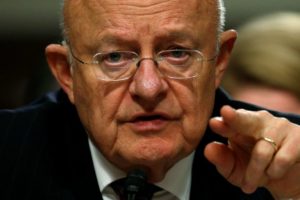by WorldTribune Staff, January 6, 2017
Political and media elites are late in recognizing what has been known for quite some time, that foreign cyber threats to U.S. national security are real, analysts say.
All it took was a sweeping election victory by an unlikely Republican presidential candidate for charges of meddling in the U.S. political process by Russia, not to mention other foreign powers, to dominate the media’s version of the national conversation.

Meanwhile, critics of the politicization of U.S. intelligence are raising questions about the timing and validity of Director of National Intelligence James Clapper’s testimony to Congress Thursday.
A former CIA official charged that the unprecedented presentation representing all U.S. agencies was clearly intended to damage the legitimacy of President-elect Donald Trump and the American electorate’s stunning repudiation of the wealthy and powerful Washington government class on Nov. 8, 2016.
Dr. Peter Vincent Pry, Executive Director of the Task Force on National and Homeland Security and Director of the U.S. Nuclear Strategy Forum, wrote in an open letter to the American people on Jan. 3 that he was “deeply concerned so many, including usually sensible Republican Senators, are supporting the narrative about Moscow’s ‘hacking the elections’ without challenging its veracity. Indeed, Obama’s Intelligence Community has not even proved that Moscow hacked the Democratic National Committee.
In the letter, published by Family Security Matters and Arutz Sheva, Pry wrote: “Do you understand that allegations by President Obama’s Intelligence Community that Russia “hacked the elections” to favor Trump is disinformation, designed to undermine the legitimacy of the incoming Trump Administration and of the Republican Congress that was elected on Trump’s coattails?
I have reviewed the unclassified Intelligence Community reports of October 7 and December 29, 2016 and neither offers a single shred of evidence that Russia hacked the Democratic National Committee or that Putin directed cyber operations to favor Trump. Both reports merely assert this theory, but offer no evidence that proves it.”
Columnist T. Beckett Adams, writing for the Washington Examiner, said he was “pleased as punch to hear members of the Obama administration and leading pundits recognize Russian President Vladimir Putin as an enemy to the U.S. and the free West.
“However, this was obvious four years ago, back when these same politicos and pundits were ridiculing former Massachusetts Gov. Mitt Romney for saying, ‘Russia [is] without question, our number-one geopolitical foe.’ ”
Fast forward four years and, “following Clinton’s defeat, media have sounded the alarm on Russian aggression, warning loudly and repeatedly of the threat posed by the Putin regime,” Adams wrote.
“It’s only after Clinton loses the 2016 election that we’re going to talk about the dangers of the Putin regime? You can invade Ukraine, but boy, you better not snare John Podesta with a phishing scam.”
The United States’ top intelligence official said in testimony before Congress on Jan. 5 that a suspected Russian hacking campaign constituted unprecedented meddling in the U.S. electoral process.
“I don’t think we’ve ever encountered a more aggressive, a more direct effort to interfere in our elections processes than in this case,” Clapper told the Senate Armed Services Committee.
The committee’s Republican chairman, Sen. John McCain, said in opening remarks at the hearing that there is “no escaping the fact that this committee meets today for the first time in this new Congress in the aftermath of an unprecedented attack on our democracy.”
Julian Assange, the founder of WikiLeaks, continues to insist that Russia was not the source of the leaked e-mails that were published by the website.
And just before the Senate hearing began, President-elect Donald Trump published a series of posts on Twitter, denying he was agreeing with Assange but also suggesting that Assange’s claim might be considered credible.
“I simply state what he states, it is for the people to make up their own minds as to the truth,” Trump wrote. “The media lies to make it look like I am against ‘Intelligence’ when in fact I am a big fan!”
